Responsible Consumption and Production in South Africa
Write an essay on a sustainable development goal in South Africa, its relation to the concept of Green Economy, supporting policies, and its nexus with other sustainable development goals.
23 Pages6882 Words19 Views
Added on 2022-09-09
Responsible Consumption and Production in South Africa
Write an essay on a sustainable development goal in South Africa, its relation to the concept of Green Economy, supporting policies, and its nexus with other sustainable development goals.
Added on 2022-09-09
ShareRelated Documents
Running head: RESPONSIBLE CONSUMPTION AND PRODUCTION IN SOUTH AFRICA
Responsible Consumption and Production in South Africa
Name of the Student
Name of the University
Author note
Responsible Consumption and Production in South Africa
Name of the Student
Name of the University
Author note
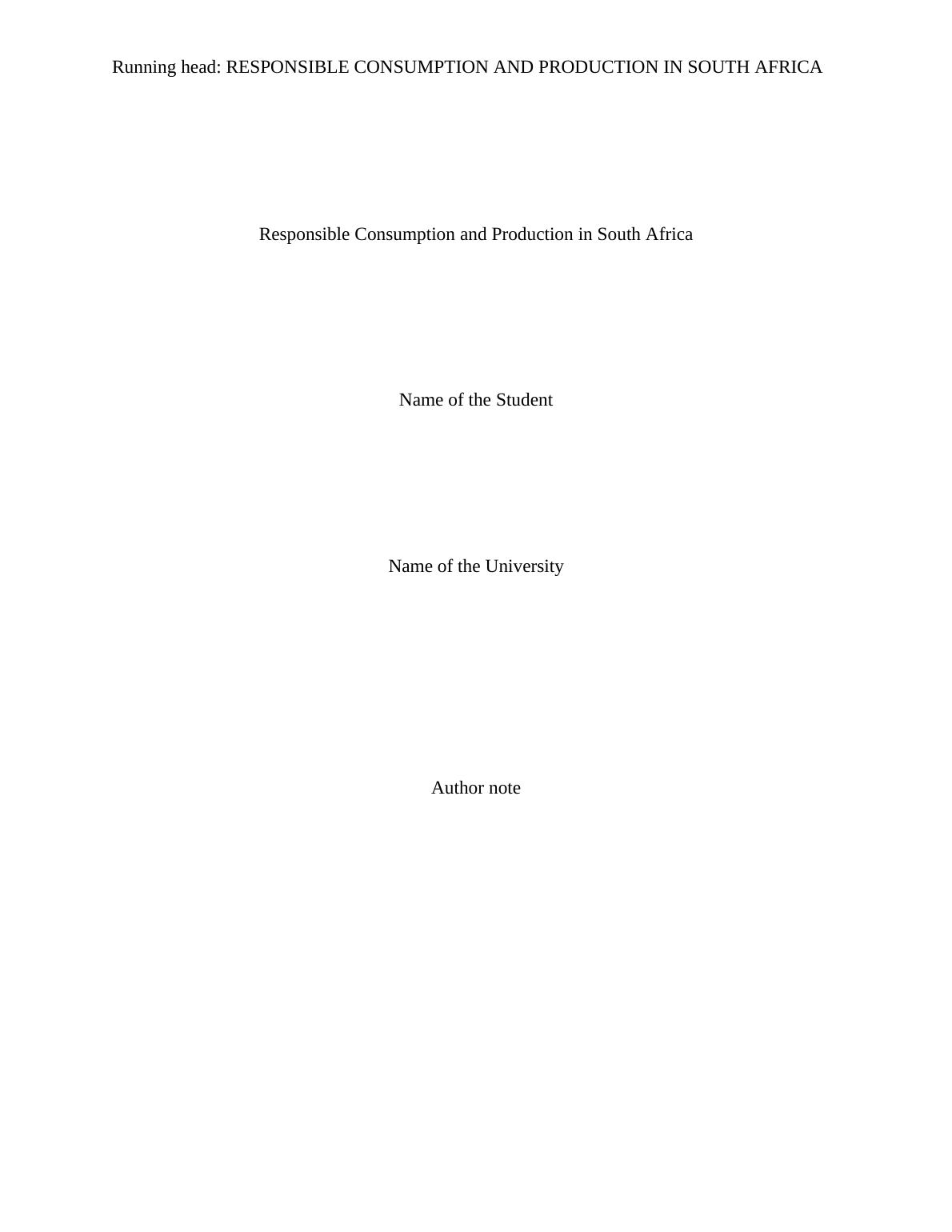
RESPONSIBLE CONSUMPTION AND PRODUCTION IN SOUTH AFRICA1
Introduction
The main aim of the United Nation (UN) is to maintain international security and peace.
Thus, the intergovernmental organization achieves international cooperation through establishing
friendly relations among countries of the world. In addition, it also harmonizes the actions taken
by the countries around the world for a specific agenda (Bekun, Emir and Sarkodie 2019). In
2015, the UN suggested the 2030 Agenda for sustainable development for the member states of
the intergovernmental organization. It offers a shared blueprint for prosperity and peace for the
planet and people, which will be implemented in present as well as future. All the member states
of the UN adopted the 2030 Agenda for Sustainable Development, which consists of 17
Sustainable Development Goals (SDGs). Therefore, all member states including developed and
developing countries need to take initiatives regarding sustainable development goals to make
the 2030 agenda successful. One such member states of the UN is South Africa, which adopted
the 2030 agenda.
It is the second largest country of the Africa and a mixed economy. Despite having
relatively high Gross Domestic Product (GDP) per capita in comparison with other countries of
the Africa, it has a high income inequality along with relatively high unemployment and poverty.
The 17 sustainable development goals include no poverty, zero hunger, good health and well-
being, quality education, gender equality, clean water and sanitation, affordable and clean
energy, decent work and economic growth, industry, innovation and infrastructure, required
inequalities, sustainable cities and communities, responsible consumption and production,
climate action, life below water, life on land, peace, justice and strong institutions and
partnerships for the goals (Waibel et al. 2017). This paper taken into consideration one of the
developmental agenda of the UN such as responsible consumption and production and examines
Introduction
The main aim of the United Nation (UN) is to maintain international security and peace.
Thus, the intergovernmental organization achieves international cooperation through establishing
friendly relations among countries of the world. In addition, it also harmonizes the actions taken
by the countries around the world for a specific agenda (Bekun, Emir and Sarkodie 2019). In
2015, the UN suggested the 2030 Agenda for sustainable development for the member states of
the intergovernmental organization. It offers a shared blueprint for prosperity and peace for the
planet and people, which will be implemented in present as well as future. All the member states
of the UN adopted the 2030 Agenda for Sustainable Development, which consists of 17
Sustainable Development Goals (SDGs). Therefore, all member states including developed and
developing countries need to take initiatives regarding sustainable development goals to make
the 2030 agenda successful. One such member states of the UN is South Africa, which adopted
the 2030 agenda.
It is the second largest country of the Africa and a mixed economy. Despite having
relatively high Gross Domestic Product (GDP) per capita in comparison with other countries of
the Africa, it has a high income inequality along with relatively high unemployment and poverty.
The 17 sustainable development goals include no poverty, zero hunger, good health and well-
being, quality education, gender equality, clean water and sanitation, affordable and clean
energy, decent work and economic growth, industry, innovation and infrastructure, required
inequalities, sustainable cities and communities, responsible consumption and production,
climate action, life below water, life on land, peace, justice and strong institutions and
partnerships for the goals (Waibel et al. 2017). This paper taken into consideration one of the
developmental agenda of the UN such as responsible consumption and production and examines
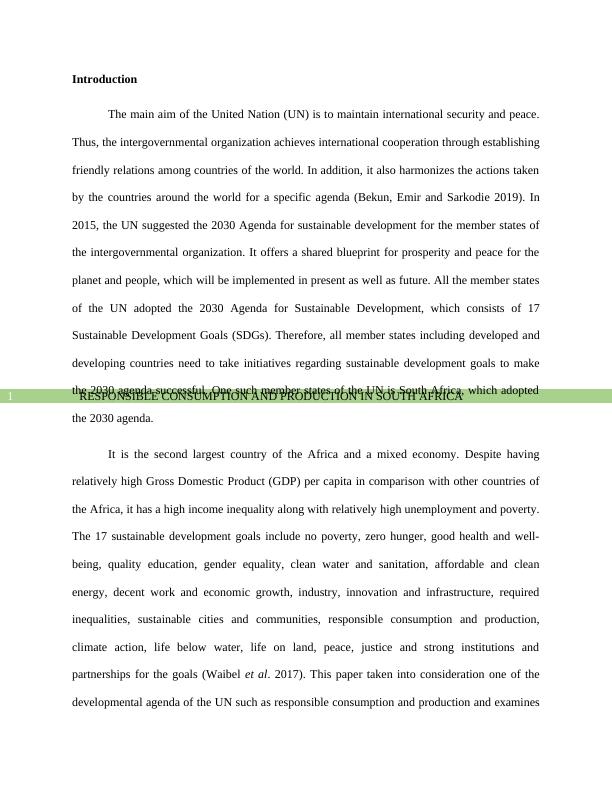
RESPONSIBLE CONSUMPTION AND PRODUCTION IN SOUTH AFRICA2
the initiatives adopted by the South Africa in order to achieve that sustainable developmental
goal. Furthermore, it also emphasizes on the role of responsible consumption and production on
the economy of South Africa and it will help the country to retain the concept of the green
economy (McEwan, Hughes and Bek 2015). Here, the application of the nexus approach will
help to determine the relationship between the chosen and other developmental goals. This paper
assesses the role of the gender mainstreaming on the identified goal. To complete the paper
valuable insights from some articles have been incorporated.
The article on Another look at the relationship between energy and consumption, carbon
dioxide emissions, and economic growth in South Africa has been incorporated to investigate
how energy consumption leads to carbon dioxide emission and effects the economic growth in
South Africa (Bekun, Emir. and Sarkodie 2019). Here, the included article on Sustainable
consumption and production in food supply chain: A conceptual framework helps to understand
the application of sustainable production and consumption in the food supply chain (Govindan
2018). The article on Governance arrangements for the future food system: Addressing
complexity in South Africa has been incorporated to examine the food security related issues in
the country (Pereira and Drimie 2016). The article on Food security in South Africa: key policy
issues for the medium term has been included to assess the key policy issues in case of food
security in South Africa (De Klerk et al. 2015). Here, the selected article to analyse the
sustainable development goal is, A systematic study of Sustainable Development Goal (SDG)
interactions (Pradhan et al. 2017). The article on Green economy and related concepts: An
overview has been incorporated to understand the role green economy on the responsible
consumption and production (Loiseau et al. 2016). The article on Cross-sectoral strategies in
global sustainability governance: towards a nexus approach has been included to analyse the
the initiatives adopted by the South Africa in order to achieve that sustainable developmental
goal. Furthermore, it also emphasizes on the role of responsible consumption and production on
the economy of South Africa and it will help the country to retain the concept of the green
economy (McEwan, Hughes and Bek 2015). Here, the application of the nexus approach will
help to determine the relationship between the chosen and other developmental goals. This paper
assesses the role of the gender mainstreaming on the identified goal. To complete the paper
valuable insights from some articles have been incorporated.
The article on Another look at the relationship between energy and consumption, carbon
dioxide emissions, and economic growth in South Africa has been incorporated to investigate
how energy consumption leads to carbon dioxide emission and effects the economic growth in
South Africa (Bekun, Emir. and Sarkodie 2019). Here, the included article on Sustainable
consumption and production in food supply chain: A conceptual framework helps to understand
the application of sustainable production and consumption in the food supply chain (Govindan
2018). The article on Governance arrangements for the future food system: Addressing
complexity in South Africa has been incorporated to examine the food security related issues in
the country (Pereira and Drimie 2016). The article on Food security in South Africa: key policy
issues for the medium term has been included to assess the key policy issues in case of food
security in South Africa (De Klerk et al. 2015). Here, the selected article to analyse the
sustainable development goal is, A systematic study of Sustainable Development Goal (SDG)
interactions (Pradhan et al. 2017). The article on Green economy and related concepts: An
overview has been incorporated to understand the role green economy on the responsible
consumption and production (Loiseau et al. 2016). The article on Cross-sectoral strategies in
global sustainability governance: towards a nexus approach has been included to analyse the
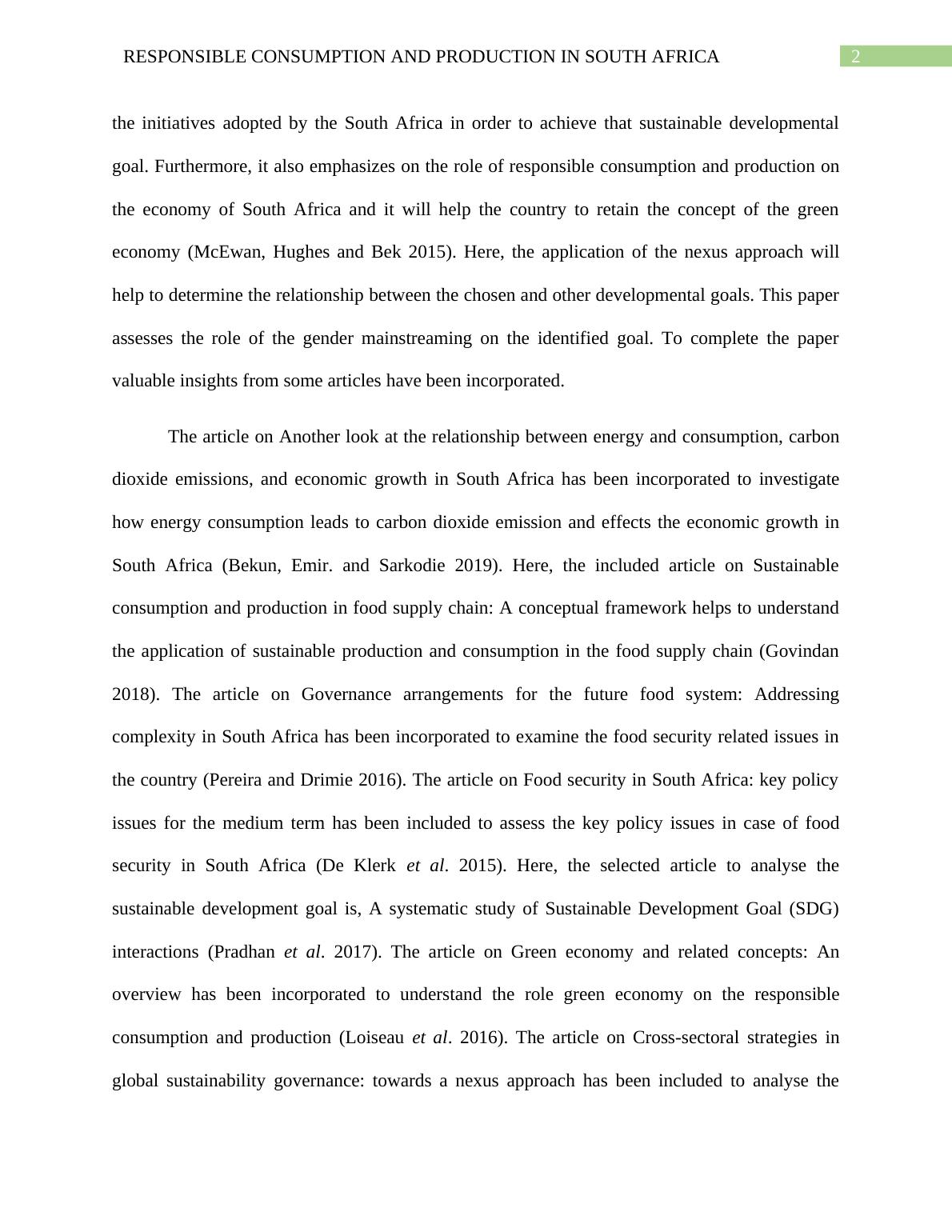
RESPONSIBLE CONSUMPTION AND PRODUCTION IN SOUTH AFRICA3
importance of the nexus approach in the context of sustainable development goal (Boas,
Biermann and Kanie 2016). The article on Gender mainstreaming in local economic
development processes: a South African perspective has been added to get a compressive
concept on gender mainstreaming in terms of responsible consumption and production in South
Africa (Vyas-Doorgapersad 2017).
Literature Review
One of the vital goals under the 2030 sustainable development goals is responsible
consumption and production. It aims to ensure sustainable patterns of consumption and
production. It mainly suggests to make fundamental changes in the way production and
consumption of the goods and services happen in the society. It is recommended to avoid
unsustainable patterns of consumption and production through strengthening technological,
scientific and innovative capacity of the developing countries with the help of mobilization from
all sources (Za.undp.org 2020). The assistance in the field of technical and financial segment will
help the developing countries to reach its goal. To fulfill the goal of the sustainable patterns of
production and consumption the countries should be assisted by the international organizations,
government, individuals, business sectors and other non-actors. Therefore, the contribution of
these bodies will help to transform the unsustainable patters of production and consumption into
the sustainable patterns production and consumption. Moreover, the UN encouraged to adopt a
framework of programmes on sustainable production and consumption for 10 years.
Though, it is encouraged for participation by all countries, it is strongly advised by the
UN to take the lead by the developing countries. It will take into consideration the strengths of
the developing nations to achieve the goals as well as sustainable development
(Sustainabledevelopment.un.org. 2020). The use of the goods and services to meet the basic
importance of the nexus approach in the context of sustainable development goal (Boas,
Biermann and Kanie 2016). The article on Gender mainstreaming in local economic
development processes: a South African perspective has been added to get a compressive
concept on gender mainstreaming in terms of responsible consumption and production in South
Africa (Vyas-Doorgapersad 2017).
Literature Review
One of the vital goals under the 2030 sustainable development goals is responsible
consumption and production. It aims to ensure sustainable patterns of consumption and
production. It mainly suggests to make fundamental changes in the way production and
consumption of the goods and services happen in the society. It is recommended to avoid
unsustainable patterns of consumption and production through strengthening technological,
scientific and innovative capacity of the developing countries with the help of mobilization from
all sources (Za.undp.org 2020). The assistance in the field of technical and financial segment will
help the developing countries to reach its goal. To fulfill the goal of the sustainable patterns of
production and consumption the countries should be assisted by the international organizations,
government, individuals, business sectors and other non-actors. Therefore, the contribution of
these bodies will help to transform the unsustainable patters of production and consumption into
the sustainable patterns production and consumption. Moreover, the UN encouraged to adopt a
framework of programmes on sustainable production and consumption for 10 years.
Though, it is encouraged for participation by all countries, it is strongly advised by the
UN to take the lead by the developing countries. It will take into consideration the strengths of
the developing nations to achieve the goals as well as sustainable development
(Sustainabledevelopment.un.org. 2020). The use of the goods and services to meet the basic
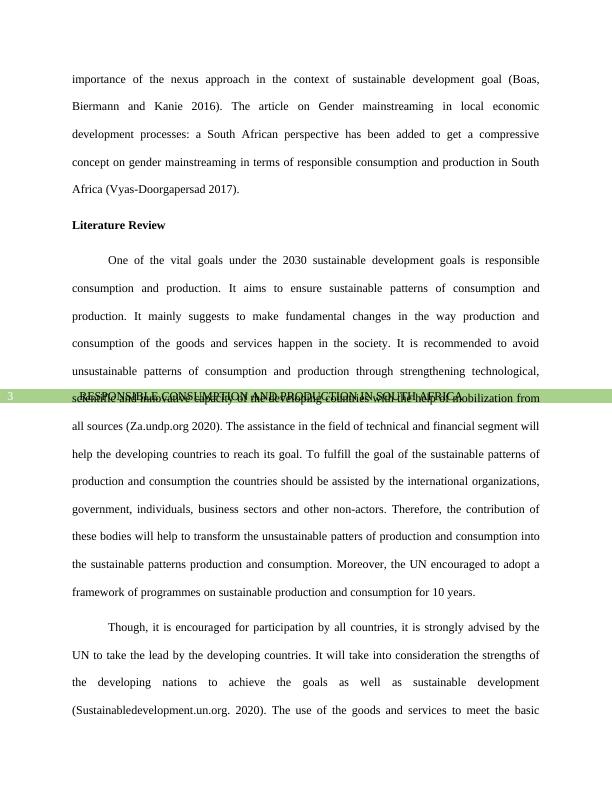
RESPONSIBLE CONSUMPTION AND PRODUCTION IN SOUTH AFRICA4
needs will help to achieve the sustainable patterns of production and consumption. Thus, there
should be minimization of use of toxic materials and natural resources along with the emissions
of pollutants and waste over the life cycle of the goods and services (Henders, Persson and
Kastner 2015). It will maintain the needs of the future generation by preventing over extraction
of the natural resources. Additionally, the role of the sustainable production and consumption is
inevitable in the sustainable development. Hence, the sustainable development fosters the social
and economic development with the help of one of the three essential requirements overreaching
objectives. These are management of natural resources, sustainable consumption and production
and eradication of poverty. Therefore, the global sustainable development can be obtained
through bringing fundamental changes in the way societies consume and produce (Kiron et al.
2015). The economy of the South Africa is resource intensive in nature, which makes responsible
consumption and production relevant in the context of South Africa.
The historical dominance of the activities under the primary sectors such as mineral
processing, synthetic fuel production, miming and metal smelting and low cost of the coal allows
the country to be energy intensive (Ingrao et al. 2016). As a result, there was a dramatic growth
in the consumption of the natural resources in the South Africa. The available water resources of
the country is drastically consumed by the manufacturing, industrial and agriculture processes. In
addition, the quality of the surfaces water resources plummeted because of pollution generating
from economic activities such as domestic use (Govindan 2018). Thus, it resulted in indirect and
direct threats to functioning of the ecology and humans. It is also equally essential to prevent the
wastage of foods to restore more efficient supply chains and production and it will maintain the
food security in the country. The problems of over consumption and production spread in every
sectors of the economy and hampered all the natural resources (Porter et al. 2017). It became
needs will help to achieve the sustainable patterns of production and consumption. Thus, there
should be minimization of use of toxic materials and natural resources along with the emissions
of pollutants and waste over the life cycle of the goods and services (Henders, Persson and
Kastner 2015). It will maintain the needs of the future generation by preventing over extraction
of the natural resources. Additionally, the role of the sustainable production and consumption is
inevitable in the sustainable development. Hence, the sustainable development fosters the social
and economic development with the help of one of the three essential requirements overreaching
objectives. These are management of natural resources, sustainable consumption and production
and eradication of poverty. Therefore, the global sustainable development can be obtained
through bringing fundamental changes in the way societies consume and produce (Kiron et al.
2015). The economy of the South Africa is resource intensive in nature, which makes responsible
consumption and production relevant in the context of South Africa.
The historical dominance of the activities under the primary sectors such as mineral
processing, synthetic fuel production, miming and metal smelting and low cost of the coal allows
the country to be energy intensive (Ingrao et al. 2016). As a result, there was a dramatic growth
in the consumption of the natural resources in the South Africa. The available water resources of
the country is drastically consumed by the manufacturing, industrial and agriculture processes. In
addition, the quality of the surfaces water resources plummeted because of pollution generating
from economic activities such as domestic use (Govindan 2018). Thus, it resulted in indirect and
direct threats to functioning of the ecology and humans. It is also equally essential to prevent the
wastage of foods to restore more efficient supply chains and production and it will maintain the
food security in the country. The problems of over consumption and production spread in every
sectors of the economy and hampered all the natural resources (Porter et al. 2017). It became
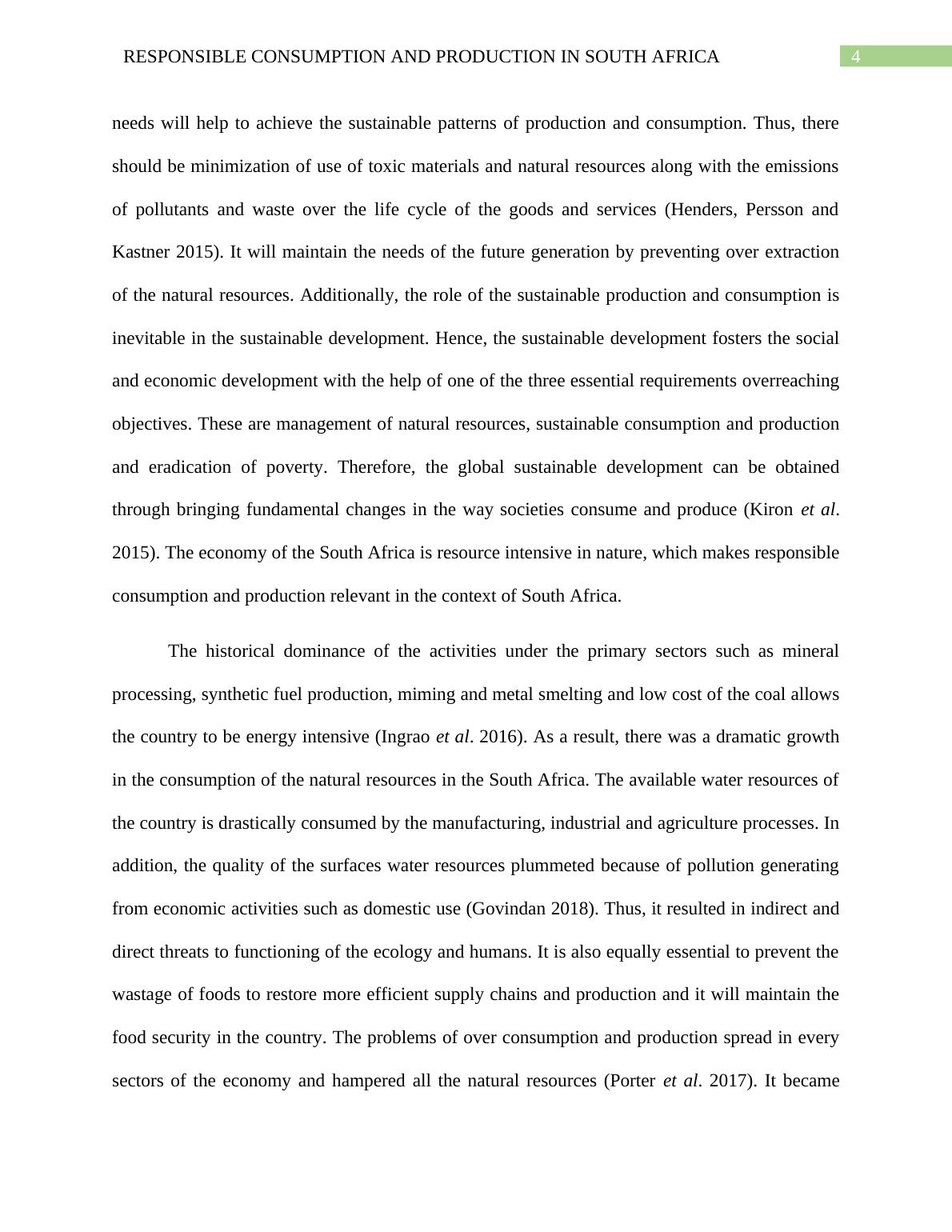
RESPONSIBLE CONSUMPTION AND PRODUCTION IN SOUTH AFRICA5
necessary for all member countries of the UN coupled with the South Africa to take global
collaborative initiatives in this regard to combat the menace of the unsuitable patterns of
production and consumption.
Moreover, the receptiveness of the business, citizens and governments to change the
unsustainable patterns of production and consumption scaled up due to the increasing cost of
managing and treating waste and scarcity of resources in South Africa together with growing
global attention on sustainable patterns of production and consumption (Nedumaran et al. 2015).
To promote the responsible consumption and production, a framework is developed by the South
Africa to make necessary progress in this regard. The key focus areas of the government of the
country include participating in the development of the framework of programmes for 10 years
and transition from the unsustainable patterns of production and consumption to sustainable
production and consumption (De Klerk et al. 2015). The government of South Africa took major
initiatives in form of developing legislation and policy, increasing consumer awareness and
protection, enabling environments for renewable energy, encouraging measures to save energy,
establishing mechanisms for sustainable procurement and funding and cleaner production
piloting and implementing through industry (Tschirley et al. 2015). Despite all these significant
steps towards achieving sustainable patterns of production and consumption, there remained
various challenges in front of the South Africa in bridging gap between the second and first
economies.
South Africa was also unable to improve the life of the poor population of the country as
well as eradicating poverty (Flatø, Muttarak and Pelser 2017). In order to, maximize the
application of the capacity, tools and funds dedicated for the responsible production and
consumption, it is required to implement stringent policy alignment. Hence, the process will be
necessary for all member countries of the UN coupled with the South Africa to take global
collaborative initiatives in this regard to combat the menace of the unsuitable patterns of
production and consumption.
Moreover, the receptiveness of the business, citizens and governments to change the
unsustainable patterns of production and consumption scaled up due to the increasing cost of
managing and treating waste and scarcity of resources in South Africa together with growing
global attention on sustainable patterns of production and consumption (Nedumaran et al. 2015).
To promote the responsible consumption and production, a framework is developed by the South
Africa to make necessary progress in this regard. The key focus areas of the government of the
country include participating in the development of the framework of programmes for 10 years
and transition from the unsustainable patterns of production and consumption to sustainable
production and consumption (De Klerk et al. 2015). The government of South Africa took major
initiatives in form of developing legislation and policy, increasing consumer awareness and
protection, enabling environments for renewable energy, encouraging measures to save energy,
establishing mechanisms for sustainable procurement and funding and cleaner production
piloting and implementing through industry (Tschirley et al. 2015). Despite all these significant
steps towards achieving sustainable patterns of production and consumption, there remained
various challenges in front of the South Africa in bridging gap between the second and first
economies.
South Africa was also unable to improve the life of the poor population of the country as
well as eradicating poverty (Flatø, Muttarak and Pelser 2017). In order to, maximize the
application of the capacity, tools and funds dedicated for the responsible production and
consumption, it is required to implement stringent policy alignment. Hence, the process will be
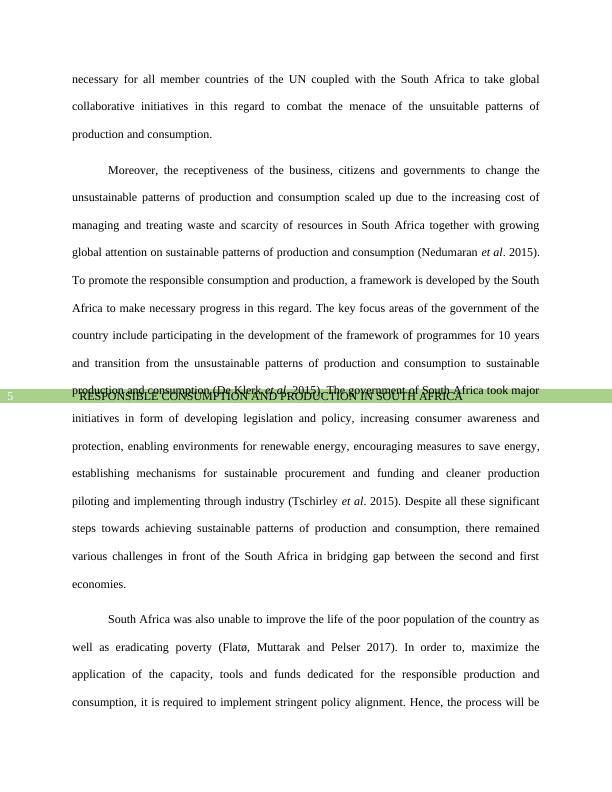
End of preview
Want to access all the pages? Upload your documents or become a member.
Related Documents
Sustainable Development Goals for Energy Access and Efficiencylg...
|8
|2045
|90
Assignment on Sustainable Development Goals - Deskliblg...
|15
|3683
|3370
United Nations Sustainable Development Goals: A Program for Global Growthlg...
|8
|1517
|110
Global economic development Assignmentlg...
|8
|2444
|42
Transforming Fashion Industry for Sustainable Production Strategieslg...
|9
|2446
|367
United Nations endorsed Sustainable Development Goals and global tourism and indigenous cultureslg...
|15
|3966
|222
